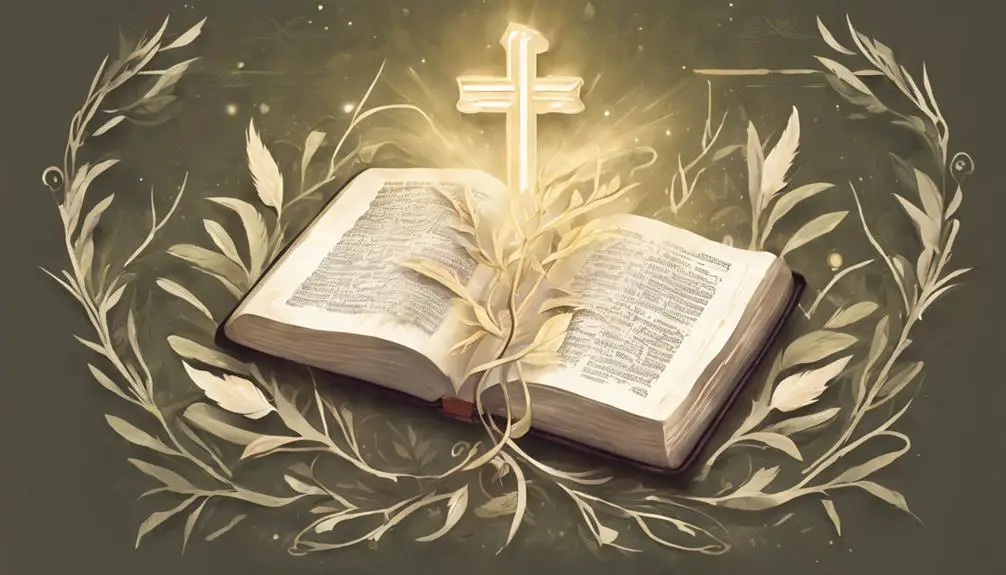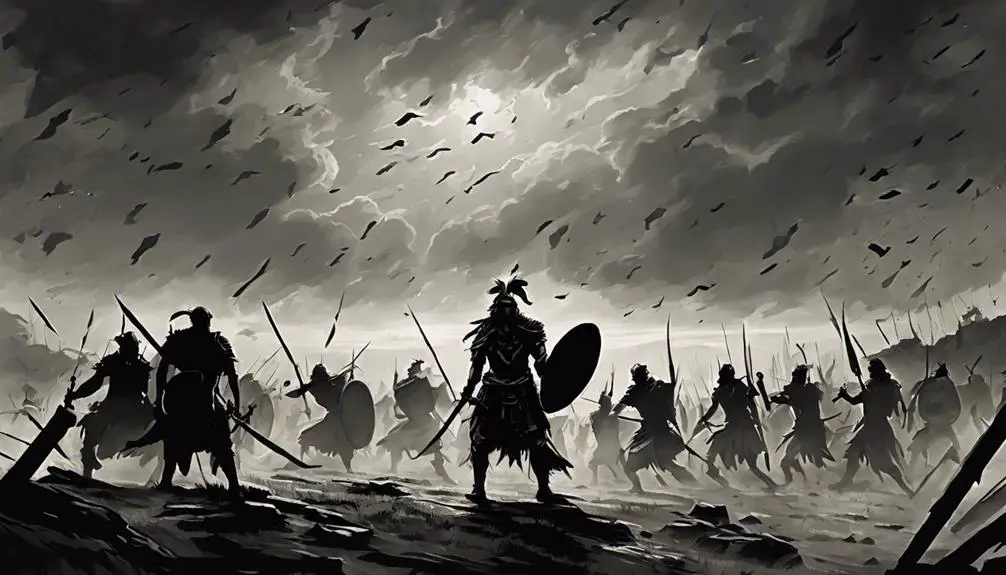Discover the stories behind 'K' names in the Bible and unveil the profound impact these characters had on history and spirituality.

K Names in the Bible
Embarking on a journey through the Bible's pages, you'll find that names starting with 'K' are not just letters; they're keys unlocking doors to ancient stories. From kings who ruled with wisdom or folly, to prophets who envisioned futures beyond their time, and rebels who challenged the status quo, each 'K' name carries a weight of history and lessons.
But why should you care about these characters? Beyond their intriguing stories, understanding these individuals offers a unique lens through which to view the cultural and historical contexts of biblical times. Let's explore the significance of these 'K' names together, uncovering the roles they played and the impact they left behind.
Key Takeaways
- 'K' names in the Bible symbolize qualities or prophetic messages, enriching biblical narratives.
- Kings and leaders with 'K' names exhibit varied leadership styles, offering moral lessons on governance.
- Prophets and faithful individuals named with 'K' emphasize the importance of heeding divine guidance.
- The etymology of 'K' names influences naming practices across Christian, Jewish, and Islamic traditions, reflecting deep cultural and religious significance.
The Significance of 'K' Names

Names beginning with 'K' in the Bible often carry profound symbolic significance, reflecting key aspects of the characters' roles and destinies. Through keen interpretations, you'll uncover that these names aren't merely labels but are imbued with deep meanings that shed light on the narrative arcs of those who bear them. This understanding is crucial as it allows for a more nuanced appreciation of the biblical texts, where names are often chosen to convey particular qualities or prophetic messages about the individuals.
Delving into the kinship dynamics among characters with 'K' names reveals intricate relationships and social structures that are pivotal to the biblical stories. These names often mark individuals who play significant roles within their families or tribes, influencing the course of events and the unfolding of God's plan throughout the scriptures. The exploration of these kinship dynamics, facilitated by a close examination of the meanings and implications of 'K' names, enriches your understanding of the biblical narrative, offering insights into the complex web of relationships that define and drive these ancient texts.
Kings and Leaders

Among the figures bearing 'K' names in the Bible, kings and leaders stand out for their pivotal roles in shaping the narrative and embodying the divine will. These individuals not only played significant parts in the establishment and expansion of kingdoms but also showcased a variety of leadership styles that have been studied and analyzed throughout history. Their actions, decisions, and faith—or lack thereof—offer deep insights into the complexities of governance and spiritual guidance within the biblical context.
Kingdom establishment, often a central theme in their stories, demonstrates the divine favor and strategic prowess required to lead a nation. For example, the differing approaches to leadership and their consequences highlight the importance of wisdom, justice, and humility. The successes and failures of these kings and leaders serve as moral and ethical lessons that transcend time.
Analyzing these biblical figures reveals a spectrum of leadership styles, from the benevolent and wise to the tyrannical and misguided. Their legacies, influenced by their faithfulness or defiance towards their divine calling, underscore the profound impact of leadership on a kingdom's destiny. This exploration into biblical kings and leaders not only enriches our understanding of historical narratives but also offers timeless lessons on leadership and governance.
Prophets and Visionaries

Shifting focus to another critical component of biblical narratives, prophets and visionaries also played indispensable roles, revealing divine messages and guiding the faithful through periods of uncertainty and change. Within this broad category, individuals with 'K' names have left indelible marks, their stories intertwined with the fabric of biblical history, offering insights into the dynamics of faith, obedience, and the prophetic voice.
Korah's rebellion, though primarily a tale of dissent, indirectly highlights the significance of prophetic guidance against the backdrop of divine will. It serves as a cautionary tale that underscores the necessity of heeding prophetic voices, which strive to align the community's actions with God's commands. This story, while not directly showcasing a prophet, delineates the chaos that ensues in the absence of prophetic wisdom.
Conversely, Kaleb's faith embodies the quintessential visionary spirit. His unwavering trust in God's promises, even in the face of overwhelming odds and community dissent, exemplifies the visionary's role in steering God's people towards faithfulness. Kaleb's narrative is a testament to the power of belief and the importance of visionaries in nurturing and sustaining the collective faith of a community.
Together, these narratives enrich our understanding of the multifaceted roles prophets and visionaries play in guiding, correcting, and inspiring the faithful.
Rebels and Adversaries

In the tapestry of biblical narratives, rebels and adversaries emerge as pivotal figures, challenging established norms and testing the bounds of faith and obedience. Among these, certain individuals stand out for their prominent roles in defiance and opposition, notably in instances like Korah's rebellion and King Ahab's defiance. These episodes aren't merely historical footnotes but serve as profound lessons on leadership, loyalty, and the consequences of straying from divine directives.
Here are four key points to consider:
- Korah's Rebellion: This event underscores the dangers of challenging divinely appointed authority. Korah's dissent against Moses wasn't just a political maneuver; it was a test of faithfulness and submission to God's chosen leader.
- King Ahab's Defiance: Ahab's reign epitomizes the peril of idolatry and the rejection of prophetic warnings. His defiance against God's commands illustrates the downfall that ensues from prioritizing worldly power and alliances over spiritual obedience.
- Impact on the Community: Both events had significant repercussions, not just for the principal figures involved but for the wider community, highlighting the communal nature of sin and repentance.
- Lessons on Leadership: These narratives offer timeless insights into the qualities of godly leadership and the pitfalls of pride, rebellion, and disobedience.
Lesser-Known Figures

While the narratives of rebels and adversaries like Korah and King Ahab capture our attention, the Bible also introduces us to lesser-known figures whose contributions and challenges offer equally profound lessons. Delving into these stories, you uncover the richness of the biblical tapestry, where even the briefest mentions can signify deep theological and moral insights.
Name |
Context |
Significance |
|---|---|---|
Keziah |
Job's daughter |
Symbolizes restoration and beauty; Keziah's character is emblematic of the resilience and grace found in the aftermath of suffering. |
Keturah |
Abraham's wife after Sarah |
Represents the continuation of Abraham's lineage; Keturah's legacy is crucial for understanding the expansive nature of the Abrahamic promise. |
Kenan |
A descendant of Seth |
Illustrates the generational faithfulness within Adam's line, emphasizing the importance of legacy. |
Kish |
Father of King Saul |
His role underlines the unexpected ways God elevates individuals and families for His purposes. |
Analyzing these figures, you're prompted to consider the broader implications of their stories. Keziah's character and Keturah's legacy, though scarcely detailed, are imbued with layers of meaning that enrich our understanding of biblical narratives and the divine orchestration within them.
Cultural and Historical Impact

Exploring the cultural and historical impact of biblical names beginning with 'K' reveals their profound influence on religious traditions and societal norms. You'll find that the etymology of K names not only enriches your understanding of their origins but also highlights their significance across various cultures and periods. Here's how these names have left their mark:
- Roots in Antiquity: The etymology of K names often traces back to Hebrew, Greek, or Aramaic origins, illustrating their deep roots in biblical history and the spread of these cultures through conquest and trade.
- Influence on Religious Practices: Many K names are borne by saints, prophets, or figures pivotal to religious narratives, thereby influencing naming practices within Christian, Jewish, and Islamic traditions.
- Modern Day Resonance: K names maintain their popularity due to their perceived uniqueness and the cultural capital they carry. This modern-day influence is evident in how these names are chosen for their biblical connections, imparting spiritual significance.
- Symbolic Meanings: The etymology often carries symbolic meanings—courage, purity, or devotion—qualities that parents might hope to bestow upon their children, reflecting the values held by societies throughout history.
Frequently Asked Questions
How Do Modern Translations of the Bible Handle the Transliteration of Names Starting With "K" From Hebrew or Greek?
You'll find that modern Bible translations approach the transliteration of names starting with 'k' from Hebrew or Greek with considerable care. They aim for transliteration consistency, guided by academic interpretations. This ensures that the original phonetic nuances are as faithfully represented as possible in the target language.
Scholars meticulously analyze ancient texts to maintain precision, ensuring that these names resonate correctly with their historical and cultural significance.
Are There Any 'K' Names in the Bible That Have Evolved Into Popular Names Today, Outside of Religious Contexts?
You're navigating a sea of names, where 'K' names catch your eye, shimmering with familiarity yet veiled in historical depth.
In this exploration, you'll find that 'K' names, stripped from their biblical origins, have woven into the fabric of society, embodying popularity trends and cultural adaptations.
Analyzing these names reveals a tapestry of evolution, where ancient roots bloom into contemporary appeal, illustrating the dynamic interplay between tradition and modernity.
How Do the Meanings of 'K' Names in the Bible Compare to the Meanings of Names Starting With Other Letters in Terms of Their Spiritual or Moral Significance?
When analyzing biblical names, you'll find that 'K' names often carry kingly significance, reflecting leadership and authority. Compared to names starting with other letters, their spiritual or moral significance is profound, shaped by cultural interpretations over time.
This distinction highlights how the initial letter can influence the perceived power and virtue of a name. In essence, 'K' names in the Bible embody traits of leadership and moral strength, distinguishing them from others.
Have Any Archaeological Discoveries Confirmed the Historical Existence of Lesser-Known Biblical Figures With 'K' Names?
You're diving into whether archaeological findings have shone a light on biblical characters, particularly those less spotlighted.
Yes, discoveries like King Jehu's inscription and Kerioth's excavation stand out. These findings offer tangible evidence that corroborates the historical existence of these individuals, providing a solid foundation for their biblical mentions.
Such discoveries not only enrich our understanding of history but also affirm the interconnection between archaeology and biblical narratives, especially for figures less emphasized in mainstream discussions.
In Biblical Numerology, Do Names Starting With 'K' Hold Any Specific Significance or Symbolic Meaning That Differs From Names Starting With Other Letters?
Ever wondered about the deeper meanings behind names?
In biblical numerology, names starting with 'K' don't inherently carry a distinct significance compared to other letters. However, when delving into numerology principles, each letter can symbolize different aspects.
'K', for instance, could be analyzed for its connection to kingdom symbolism in a broader, metaphorical sense. Yet, this interpretation is more about the analytical exploration of language than a strict, established doctrine.
Conclusion
In your exploration of biblical 'K' names, you've traversed a landscape teeming with kings of unparalleled valor, prophets who've glimpsed the cosmos's secrets, and rebels whose defiance shook the heavens.
These names, etched in the annals of history, are more than mere monikers; they're the keystones of civilization's grand edifice. Their cultural and historical impact, akin to the force of a thousand suns, illuminates the intricate tapestry of human history, offering insights into our collective soul with astonishing precision.



Sign up